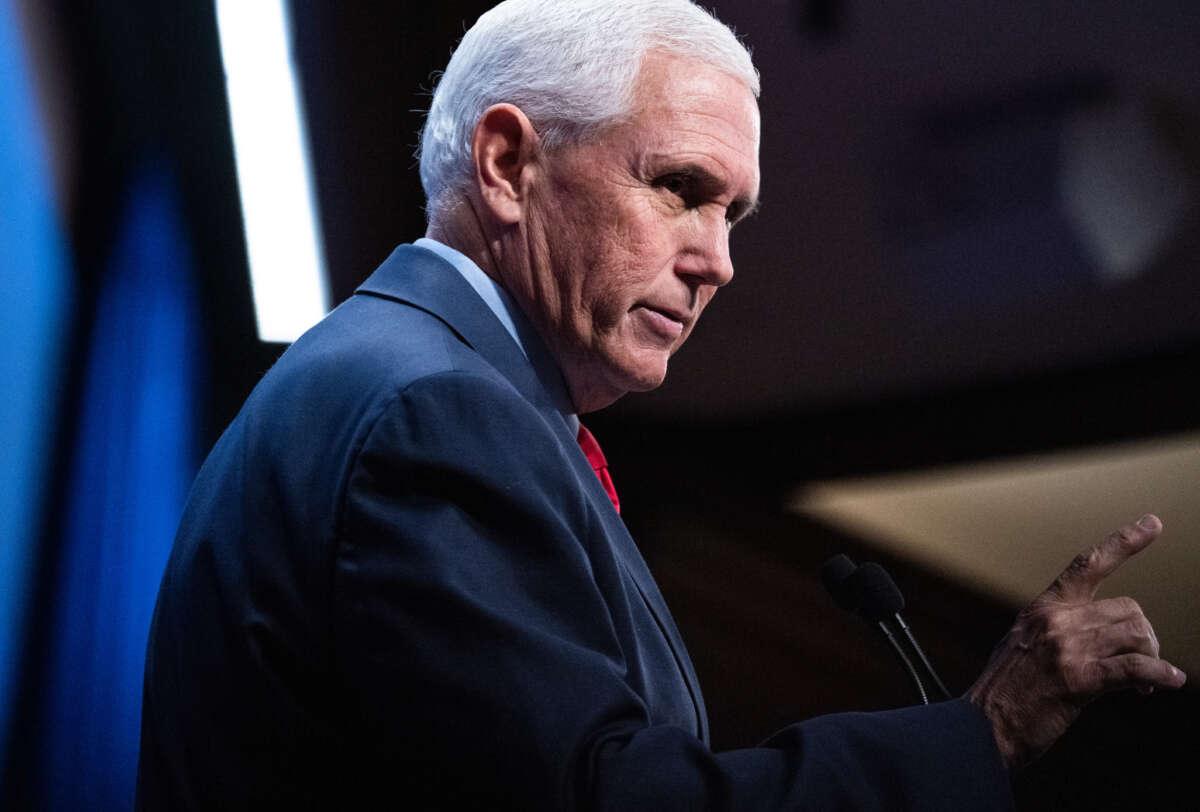Former Vice President Mike Pence, who is likely to run for the Republican nomination for president in 2024, recently called for having a “conversation” on privatizing Social Security, Medicare and other critical social safety net programs.
“I think we can replace the New Deal programs with a better deal,” Pence said in a Fox News interview on Thursday.
Pence suggested that Social Security — a social insurance program that provides disability and retirement benefits regardless of income levels — should be privatized and replaced with a system in which people can have their own accounts that are tied to investments in the stock market and personal contribution levels.
Such a change could be devastating for people with low incomes, who are often unable to contribute to retirement accounts. Recent factors like the pandemic, inflation, market pressures and high gas prices — which have made it more difficult for most Americans to save for retirement — have hit people with low incomes even harder.
Replacing Social Security with a private system would also have a disproportionate impact on people of color, research has found. An analysis by the Center on Budget and Policy Priorities, which looked at privatization efforts in 2006, noted that any change to a private system would inevitably require benefit cuts, which would disproportionately impact Black income earners’ retirements.
“The benefit cuts would represent a larger percentage of African Americans’ overall retirement income because Social Security makes up a much bigger share of retirement income for African Americans than for whites,” the report stated.
A separate report from 2016 by In the Public Interest noted that privatization efforts for other public goods and systems have negatively impacted access for marginalized groups. Such efforts can “create parallel systems in which one system propped up by private interests typically serves higher-income people, while another lesser quality system serves lower-income people,” the report said, adding that, “in some situations, poor individuals and families can lose access to the public good completely.”
“All of these cases increase socioeconomic segregation, which often results in racial segregation,” the report stated. “When they are privatized, public goods that were meant to serve everyone can morph into separate and unequal systems that further divide communities and perpetuate inequality.”
At a fundraising event earlier this month, Pence claimed that privatizing Social Security would lower government costs — a statement that many experts later pointed out was false, with Salon reporting that similar proposals in the past would have led to trillions of dollars in federal debt.
President Joe Biden, who is likely to seek another term as president, warned during his State of the Union address last week that Republicans aimed to cut Social Security and Medicare by allowing the programs to “sunset” — meaning that they would expire after a certain number of years unless new funding was passed, rather than being automatically renewed.
“Some Republicans want Social Security and Medicare to sunset,” Biden said during his speech, eliciting jeers from Republicans in the audience.
“Anybody who doubts it, contact my office, I’ll give you a copy of the proposal,” Biden said.
Biden was referring to the “12-point Rescue America” plan authored by Florida Republican Senator Rick Scott, which has been endorsed by other members of the party. The proposal called for sunsetting all federal legislation within a certain number of years, requiring laws that are automatically renewed year-by-year — including Social Security and Medicare — to be voted on regularly by Congress.
After the plan was met with widespread criticism, Scott amended his proposal, claiming that he “never intended to apply” the sunsetting clause to Social Security or Medicare.
The Biden administration has showcased how several members of the GOP have explicitly stated that they intend to destroy Social Security completely.
“It will be my objective to phase out Social Security. To pull it up by the roots, and get rid of it,” Sen. Mike Lee (R-Utah) once said, the White House pointed out in a fact sheet.
24 Hours Left: All gifts to Truthout now matched!
From now until the end of the year, all donations to Truthout will be matched dollar for dollar up to $18,000! Thanks to a generous supporter, your one-time gift today will be matched immediately. As well, your monthly donation will be matched for the whole first year, doubling your impact.
We have just 24 hours left to raise $18,000 and receive the full match.
This matching gift comes at a critical time. As Trump attempts to silence dissenting voices and oppositional nonprofits, reader support is our best defense against the right-wing agenda.
Help Truthout confront Trump’s fascism in 2026, and have your donation matched now!
